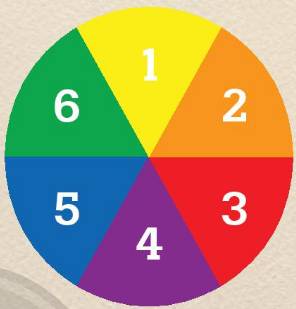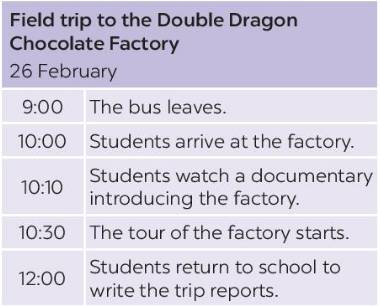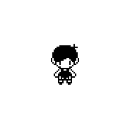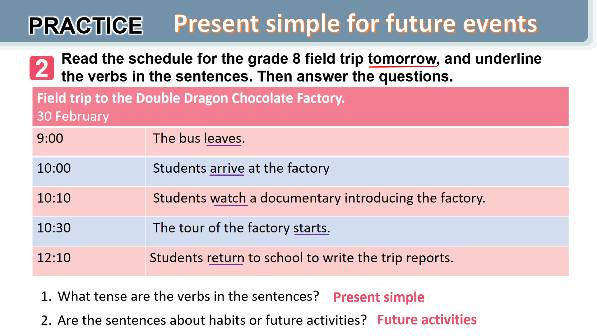Read the text in B again and underline the conditional sentences.

Những câu hỏi liên quan
Read the Learn this! box and complete it. Underline all the examples of the second conditional in the dialogue.LEARN THIS! The second conditionalWe use the second conditional to talk about an imaginary situation or event and its result.We use the 1_________ tense for the situation or event and 2_________+ infinitive without to for the result.
Đọc tiếp
Read the Learn this! box and complete it. Underline all the examples of the second conditional in the dialogue.
LEARN THIS! The second conditional We use the second conditional to talk about an imaginary situation or event and its result. We use the 1_________ tense for the situation or event and 2_________+ infinitive without to for the result. |
LEARN THIS! The second conditional (Câu điều kiện loại 2) We use the second conditional to talk about an imaginary situation or event and its result. (Chúng ta sử dụng câu điều kiện loại 2 để nói về một tình huống hoặc sự kiện tưởng tượng và kết quả của nó.) We use the 1 past tense for the situation or event and 2 would / could + infinitive without to for the result. (Chúng ta sử dụng thì 1past cho tình huống hoặc sự kiện và 2 would / could + động từ nguyên thể không có ‘to’ cho kết quả.) |
Alfie: This is an amazing place. I wish I lived here.
Macy: Me too. If only I were a member of the Howard family!
Alfie: But if it were my house, I wouldn't allow people to visit.
Macy: That's mean! You'd get bored on your own.
Alfie: Oh, I'd let my friends visit, of course. But not the public.
Macy: If you had a party, you could invite hundreds of people!
Alfie: I know. The parties would be better if I made a few changes, though.
Macy: What kinds of changes?
Alfie: Well, if those trees weren't there, there'd be room for a swimming pool!
Macy: You could make some changes inside as well. I mean, look at this corridor.
Alfie: The Antique Passage, you mean?
Macy: Yes. If you took away all the statues, you could build a great bowling alley there!
Đúng 0
Bình luận (0)
Read the Reading Strategy. Then read the sentences below and the highlighted words in the text. Say which sentence links to which highlighted word and underline the part of the sentence which helped you to decide.A. You see the world differently, develop your own views and your own sense of right and wrong.B. They may not say so, but they are probably feeling a sense of loss and may even feel rejected by you.C. Firstly, let your parents know that you still love and value them.D. Keep talking to...
Đọc tiếp
Read the Reading Strategy. Then read the sentences below and the highlighted words in the text. Say which sentence links to which highlighted word and underline the part of the sentence which helped you to decide.
A. You see the world differently, develop your own views and your own sense of right and wrong.
B. They may not say so, but they are probably feeling a sense of loss and may even feel rejected by you.
C. Firstly, let your parents know that you still love and value them.
D. Keep talking to your parents.
E. In general, emotionally and socially, the adolescents like you are experiencing profound changes in terms of freedom, privacy, interests, decisions and opinions.
F. You hate being told what to do all the time.
G. Despite this, you should always listen carefully.
A. opinions and idealistic
B. communication
C. secondly
D. communication
E. physically
F. made decision
G. made decisio
Đúng 0
Bình luận (0)
3. C. Read the sentences with the zero conditional and the first conditional. Underline the correct verb form. (Đọc các câu điều kiện loại 0 và điều kiện loại 1. Gạch chân dạng đúng của động từ.)1. If you need some money, go / will go to the ATM.2. Put on your coat if it rains / will rain.3. If our friends come tonight, we have / ’ll have a party.4. If you don’t pay me, I didn’t do / won’t do the work.5. If you press / will press this button, the washing machine turns off.6. We meet / ’ll meet y...
Đọc tiếp
3. C. Read the sentences with the zero conditional and the first conditional. Underline the correct verb form.
(Đọc các câu điều kiện loại 0 và điều kiện loại 1. Gạch chân dạng đúng của động từ.)
1. If you need some money, go / will go to the ATM.
2. Put on your coat if it rains / will rain.
3. If our friends come tonight, we have / ’ll have a party.
4. If you don’t pay me, I didn’t do / won’t do the work.
5. If you press / will press this button, the washing machine turns off.
6. We meet / ’ll meet you at the airport if we have time tomorrow.
7. I ask / ’ll ask my parents for the money if the bank doesn’t give me a loan.
3. C. Read the sentences with the zero conditional and the first conditional. Underline the correct verb form.
(Đọc các câu điều kiện loại 0 và điều kiện loại 1. Gạch chân dạng đúng của động từ.)
1. If you need some money, go / will go to the ATM.
2. Put on your coat if it rains / will rain.
3. If our friends come tonight, we have / ’ll have a party.
4. If you don’t pay me, I didn’t do / won’t do the work.
5. If you press / will press this button, the washing machine turns off.
6. We meet / ’ll meet you at the airport if we have time tomorrow.
7. I ask / ’ll ask my parents for the money if the bank doesn’t give me a loan.
Đúng 2
Bình luận (0)
3. Read the text again and circle the option (A, B, or C) to complete the sentences. 1. The house will be ______.A. in the mountainsB. on an islandC. on the Moon2. There will be a ________ in front of the house.A. garden B. pondC. swimming pool 3. The house will have ________ robots.A. manyB. someC. a lot of4. The _______ will help me to feed the dogs and cats.A. helicopterB. robot C. super smart TVGiải giúp em với ạ !
Đọc tiếp
3. Read the text again and circle the option (A, B, or C) to complete the sentences.
1. The house will be ______.
A. in the mountains
B. on an island
C. on the Moon
2. There will be a ________ in front of the house.
A. garden
B. pond
C. swimming pool
3. The house will have ________ robots.
A. many
B. some
C. a lot of
4. The _______ will help me to feed the dogs and cats.
A. helicopter
B. robot
C. super smart TV
Giải giúp em với ạ !
3. Read the text again and circle the option (A, B, or C) to complete the sentences.
Xin cái text
Đúng 0
Bình luận (1)
Read and listen to the text again. Complete the sentences using the words in exercise 1. 1. Yellow and purple are _______ colours.2. Blue and red are _______ colours.3. A _______ colour is bright and strong.4. Green and yellow are _______ colours.5. Orange and purple are _______ colours.6. A _______ colour is pale and soft.The Colour WheelHave you ever thought about how colours are related? Why do some colour combinations look good and others don’t ?According to Isaac Newton, white light consis...
Đọc tiếp
Read and listen to the text again. Complete the sentences using the words in exercise 1.
1. Yellow and purple are _______ colours.
2. Blue and red are _______ colours.
3. A _______ colour is bright and strong.
4. Green and yellow are _______ colours.
5. Orange and purple are _______ colours.
6. A _______ colour is pale and soft.
The Colour Wheel

Have you ever thought about how colours are related? Why do some colour combinations look good and others don’t ?
According to Isaac Newton, white light consists of all the colours of the rainbow. Newton then arranged them in a circle of warm and cool categories.
Red, blue and yellow are the three primary colours on the colour wheel. By mixing two primary colours, we’ve got the secondary colours green, orange and purple.
Colours can also be harmonious or complementary. Complementary colours are directly opposite each other, like red and green. Harmonious colours sit next to each other on the wheel.
Famous artists and decorators have used the colour wheel to choose the right colours ever since then. Everyone agrees that colours can affect our feelings. A vibrant red, for example, is often associated with anger or danger, while yellow is a happy colour. Blue can make people feel calm; pastel pink, which is a gentle pink, sometimes makes them think of romance, and green is the colour of nature.
What’s your favourite colour? What do you associate it with?
1 Yellow and purple are complementary colours.
2 Blue and red are primary colours.
3 A vibrant colour is bright and strong.
4 Green and yellow are harmonious colours.
5 Orange and purple are secondary colours.
6 A pastel colour is pale and soft.
$HaNa$
Đúng 1
Bình luận (0)
1. complementary
2. primary
3. vibrant
4. harmonious
5. secondary
6. pastel
My favorite color is yellow, I associate it with the sun, a beautiful sunflower.
Đúng 0
Bình luận (0)
Read the article again. Underline the verbs in the -ing form.
Katie moved to Viet Nam after her mother found a job here. Having spent the first few months fitting to the new school, Katie now has an interesting school life. Last week, she joined her school’s field trip to Con Dao island. It involved releasing sea turtles into the sea. Having listened to careful instructions from the scientists, Katie and her friends received little turtles to care for before they took the turtles to the beach. Katie then learned how to release her little turtles to the sea. Though it was a short one, participating in the trip helped Katie make new friends. She loved having done something to protect the wildlife.
Đúng 0
Bình luận (0)
Read the schedule of the field trip for the grade 8 students tomorrow, and underline the verbs in the sentences. Then answer the questions.

1. What tense are the verbs in the sentences?
2. Are the sentences about habits or future activities?
7. Look at the highlighted first conditional sentence in the text in exercise 6, and read the Learn this! box below. Complete rule a with present simple and will + verb. Then find two more examples in the text.(Nhìn vào câu điều kiện loại 1 được tô nổi lên trong bài đọc ở bài số 6, và đọc hộp Learn this! ở dưới. Hoàn thành quy tắc a với thì hiện tại đơn và will + động từ. Sau đó tìm thêm hai ví dụ khác trong bài đọc.)LEARN THIS! The first conditional(Câu điều kiện loại 1)a. We use the first cond...
Đọc tiếp
7. Look at the highlighted first conditional sentence in the text in exercise 6, and read the Learn this! box below. Complete rule a with present simple and will + verb. Then find two more examples in the text.
(Nhìn vào câu điều kiện loại 1 được tô nổi lên trong bài đọc ở bài số 6, và đọc hộp Learn this! ở dưới. Hoàn thành quy tắc a với thì hiện tại đơn và will + động từ. Sau đó tìm thêm hai ví dụ khác trong bài đọc.)
LEARN THIS! The first conditional(Câu điều kiện loại 1)
a. We use the first conditional to predict the result of an action. We use the (1) _____ to describe the action, and (2) _____ to describe the result.
If I get the job, I'll have to move to New York.
b. The if clause can come before or after the main clause. If it comes after, we don't use a comma.
I won’t take the job if it isn't challenging enough.
LEARN THIS! The first conditional(Câu điều kiện loại 1)
a. We use the first conditional to predict the result of an action. We use the (1) present simple to describe the action, and (2) will + verb to describe the result.
(Chúng ta dùng câu điều kiện loại 1 để dự đoán kết quả của một hành động. Ta sử dụng thì hiện tại đơn cho hành động và will + động từ để mô tả kết quả.)
If I get the job, I'll have to move to New York.
(Nếu mình có được công việc này, mình sẽ chuyển đến New York.)
b. The if clause can come before or after the main clause. If it comes after, we don't use a comma.
(Mệnh đề if có thể đi trước hoặc sau mệnh đề chính. Nếu mệnh đề if đi sau, ta không cần dùng dấu phẩy.)
I won’t take the job if it isn't challenging enough.
(Mình sẽ không nhận công việc này nếu nó không đủ thử thách mình.)
Hai ví dụ khác:
If newspapers disappear entirely, we won't need newsagents.
(Nếu báo giấy biến mất hoàn toàn, chúng ta cũng không cần các quầy báo nữa.)
And what will happen if everyone learns online instead of in a classroom?
(Và điều gì sẽ xảy ra nếu như mọi người học trực tuyến thay vì trong một lớp học?)
Đúng 0
Bình luận (0)
Read and listen to the dialogue. Look at the highlighted sentences and answer the questions. Then find one more third conditional sentence in the dialogue. Sally: We were supposed to be there by five and its 5.15 already. If youd remembered the satnav, we wouldnt have got lost.Ben: We arent lost. I know where we are on the map. Were nearly there.Sally: If wed left home on time, wed have arrived by now.Ben: Well, that isnt my fault, is it? Wed have left on time if your mum hadnt phoned just as w...
Đọc tiếp
Read and listen to the dialogue. Look at the highlighted sentences and answer the questions. Then find one more third conditional sentence in the dialogue.
Sally: We were supposed to be there by five and it's 5.15 already. If you'd remembered the satnav, we wouldn't have got lost.
Ben: We aren't lost. I know where we are on the map. We're nearly there.
Sally: If we'd left home on time, we'd have arrived by now.
Ben: Well, that isn't my fault, is it? We'd have left on time if your mum hadn't phoned just as we were leaving.
Sally: Don't blame my mum! And we wasted so much time at the services. If we'd made sandwiches (like I suggested), we wouldn't have had to stop for lunch.
1 Did Ben remember the satnav?
2 Did they leave home on time?
3 Did they make sandwiches for the journey?
1 Did Ben remember the satnav?
(Ben có nhớ satnav không?)
Thông tin: “If you'd remembered the satnav, we wouldn't have got lost.”
(Nếu bạn nhớ satnav, chúng tôi sẽ không bị lạc.)
Đáp án: No, he didn’t
(Không, anh ấy đã không nhớ)
2 Did they leave home on time?
(Họ có rời nhà đúng giờ không?)
Thông tin: “If we'd left home on time, we'd have arrived by now.”
(Nếu chúng ta rời khỏi nhà đúng giờ thì chúng ta đã đến nơi rồi.)
Đáp án: No, they didn’t
(Không, họ đã không rời đúng giờ)
3 Did they make sandwiches for the journey?
(Họ có làm bánh mì kẹp cho chuyến đi không?)
Thông tin: “If we'd made sandwiches (like I suggested), we wouldn't have had to stop for lunch.”
(Nếu chúng ta làm bánh mì kẹp (như tôi đã gợi ý), thì chúng ta đã không phải dừng lại để ăn trưa.)
Đáp án: No, they didn’t
(Không, họ đã không làm bánh mì kẹp)
Đúng 0
Bình luận (0)
Read the following sentences. Underline the stressed words in each one. Then mark the stressed syllables in these words. Listen and check. 1. The earth is getting warmer and warmer.2. There will be more floods and storms in the coming years.3. ASEAN has helped its members to achieve economic growth.4. The burning of coal and oil releases a lot of carbon dioxide into the air.
Đọc tiếp
Read the following sentences. Underline the stressed words in each one. Then mark the stressed syllables in these words. Listen and check.
1. The earth is getting warmer and warmer.
2. There will be more floods and storms in the coming years.
3. ASEAN has helped its members to achieve economic growth.
4. The burning of coal and oil releases a lot of carbon dioxide into the air.
1. The earth is getting warmer and warmer.
2. There will be more floods and storms in the coming years.
3. ASEAN has helped its members to achieve economic growth.
4. The burning of coal and oil releases a lot of carbon dioxide into the air.
Đúng 2
Bình luận (0)
1. The earth is getting warmer and warmer.
2. There will be more floods and storms in the coming years.
3. ASEAN has helped its members to achieve economic growth.
4. The burning of coal and oil releases a lot of carbon dioxide into the air.
Đúng 0
Bình luận (0)
























